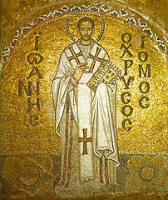
Sermon On Alms
V
Are we worthy even of standing in Paul’s shadow, or of touching his shoe, when he, shining so gloriously above all, refuses all worldly honors, while we are annoyed and take it ill if the deacons of such funds are not appointed by our vote and choice, and feel insulted when some of them spend the money in their charge without consulting us? See too in what manner he speaks of himself everywhere and never forgets. And indeed he does not here call it a command or alms, but “grace” (“to carry your grace”); showing that grace is just as necessary in the relief of the poor as in raising the dead, driving out devils, and cleansing lepers,—nay, even far more necessary in that case than in the others. And yet, even though there be grace, we require zeal and eagerness in order that we may choose grace and desire it and render ourselves worthy of it. Therefore he added this for their encouragement, that he would send a letter with their messengers.
He even went still further, promising to be the companion of their journey: “And if it be meet that I also go”, he says, “they shall go with me” (1 Cor. 16:3–4). I want you to notice his wisdom at this point. He did not refuse once for all to go with them, nor did he promise definitely—that too he left to the decision of the donors, and made them the arbiters of his going, intimating that if the offering were large enough to warrant it he would undertake the journey. For when he says, “If it be meet”, this is what he means to imply. Now if he had absolutely refused to go, he would have rendered them more timid and hesitating; but if he had definitely promised, he would have made them more careless. Therefore he neither refuses absolutely nor promises, but leaves that to the Corinthians to decide, saying, “And if it be meet”. For hearing that Paul himself might be the bearer of their offering they would address themselves with greater zeal and enthusiasm to the undertaking, because his saintly hands were to bear their gifts and his prayers bless their offering.
Now if the Corinthians made their gifts with the greater joy because it was Paul who was to receive them, what excuse will you have, you who are about to give offerings to Paul’s Master? For it is He who receives them, through the poor. But unless the offering had been large and worthy of consideration, he to whom the whole world had been entrusted and whose charge embraced all the Churches as far as the sun shines, would not have promised to take charge of the contributions. Pondering these things in our hearts, therefore, whether we ourselves dispense alms or whether we give them to others to distribute, let us not feel faint-hearted and gloomy because our wealth is being diminished. For even as the farmer, while he is sowing the seed and filling the earth with good things, is not sad and mournful and does not look upon his labor as an expenditure, but thinks of it rather in the light of the profit and harvest that it will bring forth, even though his hope is not sure; so would it not be foolish for you to hesitate, delay, and allege poverty, you who are sowing for much greater ends, and who are about to lay your wealth in the very hands of Christ?
Could not God have commanded the earth to bring forth pure gold? For He who said, “Let the earth bring forth the green herb” (Gen. 1:11), and immediately displayed it clothed with verdure, could surely have commanded fountains and rivers to pour forth a continuous stream of gold. But He did not desire this, for He condemned many to poverty, both for their own good and for yours. For poverty is more conducive to virtue than wealth, and for the sin-laden no small consolation arises from works of charity.
And God considers this of so great moment that when He had come to earth, and, clothed in the flesh, dwelt among men, He did not refuse nor consider it unbecoming to distribute with His own hands the things which were donated for the poor. And although He had made so many loaves of bread, and could by a mere command produce whatever He wanted, although He could display a thousand treasures at a time; He did not choose to do so; but, instead, He commanded His disciples to keep a pouch and to carry what was put therein and out of it to minister to the poor. For when He was speaking in riddles to Judas about His betrayal, the disciples, not understanding what He said, thought, so He says, that He had told Judas to give something to the poor: for “The purse he himself had, and carried the things that were put therein” (John 12:6).
Verily God greatly glorifies compassion, not only His toward us, but also ours toward our companions in servitude; wherefore He established many laws both in the Old and in the New Testament, commanding men to be kind in words and in money and in works. Concerning this Moses speaks in various places in his laws. This the prophets, inspired by God, proclaim: “For I desire mercy, and not sacrifice” (Hosea 6:6). The Apostles also act and speak in a like tenor (Matt. 9:13). Therefore let us not neglect this matter, which is of benefit not only to the poor, but above all to ourselves, and through which we receive greater blessings than we bestow.
Copyright ©1999-2023 Wildfire Fellowship, Inc all rights reserved

 Keep Site Running
Keep Site Running